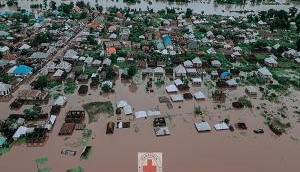New US bill to prevent China interference in Dalai Lama's succession

Amidst uncertainties around the health of Dalai Lama, US bipartisan lawmakers have introduced a new bill in Congress threatening sanctions against Chinese officials if they interfere in the spiritual leader's succession.
The Tibetan Policy and Support Act of 2019 which was introduced in the House of Representatives on September 13 by James McGovern, a Massachusetts Democrat, proposed to prohibit China from opening any new consulate in American soil until the US is permitted to establish its own diplomatic office in Tibetan capital of Lhasa.
The bill will be introduced in the Senate by Commission of the Congressional-Executive Commission on China Senator Marco Rubio (R-Fla.), reported Radio Free Asia.
The law would "strengthen US support for the Tibetan people in their struggle for human rights, religious freedom and genuine autonomy", McGovern said in a statement on Wednesday.
According to South China Morning Post, the new bill - the Tibetan policy and Support Act of 2019 - is an amendment to the Tibet Policy Act of 2002, which codified in broad terms US government support for the Tibetan people.
The bill has come amid rising concern over decreasing religious freedom for Tibetans, water security and Beijing's demand that the central government must approve the successor of the Dalai Lama. 84-year-old Dalai Lama, who fled into exile in India following a failed 1959 Tibetan revolt against Chinese rule.
China has always maintained that Tibetans are free to practice religion.
"The religious and spiritual freedoms and normal religious activities of the masses are protected by law," Wu Yingjie, the Chinese Communist Party (CCP) chief of the Tibet autonomous region, said last Thursday at a press briefing in Beijing.
However, many human rights groups have rejected these claims.
New York-based Human Rights Watch said in its 2019 annual report that the authorities in Tibet continued to "severely restrict religious freedom, speech, movement, and assembly".
-ANI
Also Read:






![BJP's Kapil Mishra recreates Shankar Mahadevan’s ‘Breathless’ song to highlight Delhi pollution [WATCH] BJP's Kapil Mishra recreates Shankar Mahadevan’s ‘Breathless’ song to highlight Delhi pollution [WATCH]](http://images.catchnews.com/upload/2022/11/03/kapil-mishra_240884_300x172.png)

![Anupam Kher shares pictures of his toned body on 67th birthday [MUST SEE] Anupam Kher shares pictures of his toned body on 67th birthday [MUST SEE]](http://images.catchnews.com/upload/2022/03/07/Anupam_kher_231145_300x172.jpg)






